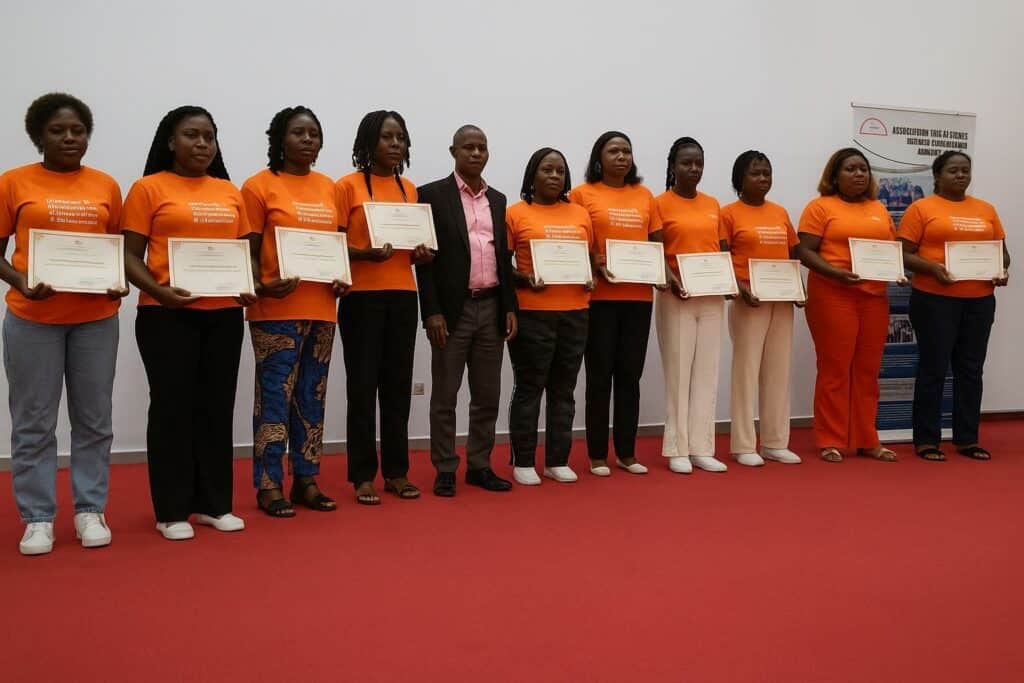A ceremony of hope at the Savorgnan-de-Brazza Memorial
The marble forecourt of the Pierre-Savorgnan-de-Brazza Memorial echoed with applause on 26 September as 165 trainees—102 women and 63 men—received their certificates after several months of rigorous instruction. Families, municipal officials and representatives of international donors attended the event, lending weight to what Dieudonné Badawé, country coordinator of the NGO Essor, called “a collective investment in the nation’s future” (Journal de Brazza, 26 September 2025).
Training initiative bridges critical skills gap
Drawn from diverse neighbourhoods of Brazzaville, the graduates mastered competencies in mechanical maintenance, computer support, electrical welding, hospitality, hairdressing, fashion design, food processing and pastry. The curriculum combined practical workshops with coaching in entrepreneurship and financial literacy, a blend designed to answer the private sector’s frequent complaint that entry-level recruits lack both hard skills and managerial reflexes. By aligning pedagogy with labour-market needs, the organisers aim to reduce a youth unemployment rate that analysts place in double digits.
Gender-responsive empowerment backed by AFD
The cornerstone of the exercise is the Relieef programme—“Renforcer l’insertion par l’emploi et l’entrepreneuriat des femmes”—launched in 2023 with support from the Agence française de développement. Relieef’s gender lens is visible in the majority-female cohort and in tailored modules on negotiating workplace equality. “Behind every statistic lies a life story now equipped for autonomy,” Badawé reminded the audience, noting the case of a 28-year-old pastry graduate who began selling cakes during her training and now envisages opening her own shop.
Agripreneurship and urban trades under EU support
Complementing Relieef is Emateli, a project financed by the European Union that favours both agricultural and urban value chains while strengthening Congolese civil-society structures. Emateli scholarships steered several trainees toward agro-processing, a sector singled out in the national development plan for its capacity to substitute imports and create rural employment. EU representatives at the ceremony hailed the cohort as proof that focused micro-interventions can yield macro-economic dividends by widening the base of formalised micro-enterprises.
‘Kotonga’ breathes life into Madibou ambitions
The French embassy’s “Kotonga” mechanism underwrote the third leg of the initiative, titled Nouvelle opportunité d’avenir, targeted at youth in Brazzaville’s eighth arrondissement, Madibou. Local officials report that the area, historically constrained by limited access to vocational centres, has begun to see informal garages, beauty salons and bakeries formalise their operations thanks to Kotonga grants. The programme’s mentorship component pairs each graduate with a sector professional for twelve months, a safeguard against early-stage business mortality.
From certificates to sustainable livelihoods
Essor’s monitoring unit has already recorded early signs of traction: several welders have secured contracts on public-housing sites, IT technicians have been recruited by start-up incubators and hospitality graduates have entered Brazzaville’s expanding hotel sector in anticipation of regional conferences. “This certificate is not merely a conclusion but a passport to the future,” Badawé stressed, urging the alumni to maintain networks forged during training and to reinvest expertise in their communities.
À retenir
The initiative’s three-pronged architecture—AFD for gender equity, EU for agripreneurship and the French embassy for community anchoring—highlights the strategic convergence of international solidarity and national priorities. With 165 transformed trajectories, the symbolic value of the graduation lies in demonstrating that focused, data-driven training can convert dormant potential into productive capital.
Le point juridique/éco
Under Congolese labour law, apprenticeships must now be formalised through written contracts, a provision that shields young workers from informality and facilitates access to social security. By delivering certified competencies, the Essor programmes ease the path to such contracts and qualify beneficiaries for micro-credit lines promoted by the Ministry of Small and Medium-Sized Enterprises. Economists note that every additional formal job generates taxable income, feeding public finances and reinforcing the government’s commitment to inclusive growth articulated in the Plan national de développement 2022-2026.

